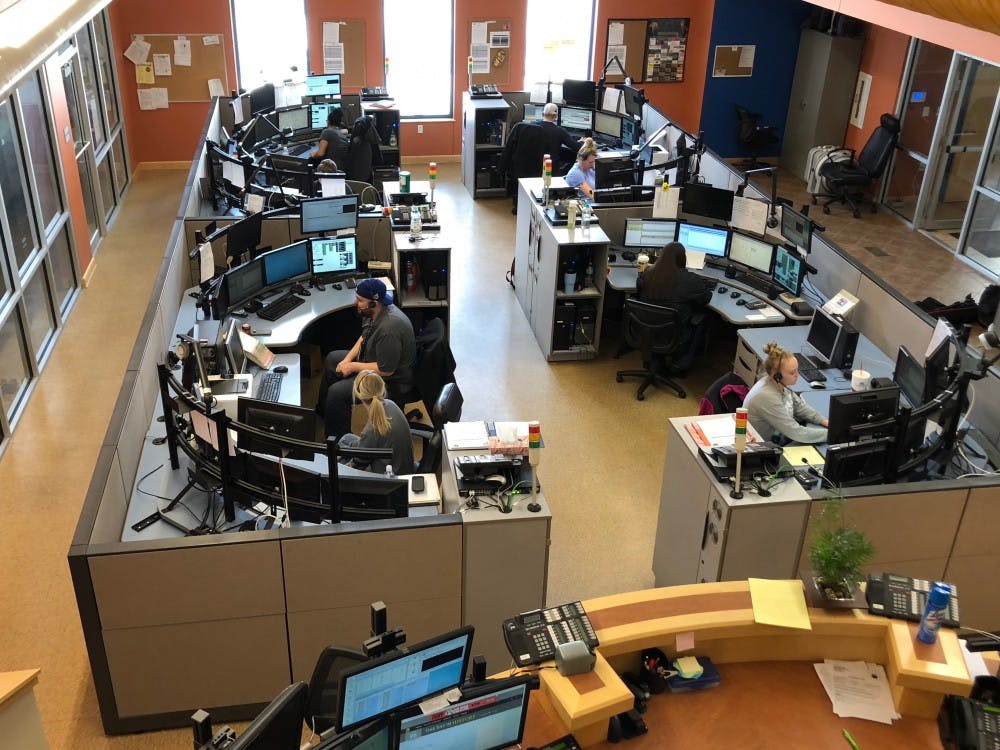When people need help in times of emergency, they call public safety agencies for help. This week is nationally recognized as a way to say “thank you” to the person on the other end of the call.
Public Safety Telecommunications Week is from April 8 to April 14 and the Delaware County Emergency Communications Center will celebrate.
The week, which started in 1981 in California, was recognized by the United States Congress in 1991, as a week to thank the emergency telecommunications technicians, or dispatchers.
Paul Singleton, director of Delaware County Emergency Communications Center said different agencies, businesses and administrators will bring in food and gifts for the dispatchers during the week “as a way to say thank you.”
“Whether the call comes by phone from the public or over a radio from a law enforcement professional, telecommunication operators are one of the most important and under-recognized components of public safety,” according to press release from the Indiana State Police.
Singleton — who retired after 32 years with Muncie Police Department — came to the center after now Muncie Police Chief Joe Winkle returned to his role as the city’s chief of police.
At the center, Singleton said he mainly deals with things like budgets and making sure the dispatchers have the tools they need.
“There are some that think they call in here, we answer the phone, and we press a button and the police or fire or EMS comes, but there is a lot of stuff in between that too,” Singleton said.
Cory Kissick, a counsel training officer and dispatcher who has been with the center for five years, also serves on the Albany fire and police departments.
“I am not the type of person who likes to be rewarded for things, that’s not why I do it. We could take a call and give CPR instructions and save somebody, but it’s not going to be in the newspaper that we did anything,” Kissick said. “That’s fine, but these people deserved to be rewarded at least once a year, I’d say. Rewarded for their hard work, because they are all hard workers.”
Lori Abrams, training coordinator at Delaware County Emergency Communications, who has been with the center for 15 years, trains the new employees and makes sure every one has up-to-date training.
“When I first started, just learning the multitasking part of it was probably the most challenging, and then taking those calls you don’t expect and getting through it,” Abrams said.
Once a person applies for a job at the center, the process can take at least eight months to learn the counsels before they are able to work the dispatching floor.
Each counsel has at least five monitors and a TV — each having the ability to access the computer aided dispatch software, maps, radios, phones and other normal computer functions.
“They’re answering phones, they’re on the radio, they’re dispatching, they’re doing a little bit of everything at once,” Abrams said.
Ashley Clark, who joined the center in September 2017, said she likes working for the center because it’s different.
“I thought it would be different because it is something that I have never done before,” said Clark.
After completing her training, Clark sat down at her counsel, ready to take her first call.
That call was a 96-year-old woman, who was driving on Interstate 69 when she saw “a man flashing himself to motorists.”
The woman told Clark she was going to pull over near him, but didn’t want the officer to file a report.
“She wanted us to go out there and check him out to make sure that he wasn’t crazy or a wanted person or anything. She wanted to take him home,” Clark said. “She was serious. It wasn’t like she was trying to play a joke on us or anything.”
While she doesn’t know if the woman brought the man home, Clark said she will always remember it.
However, not every call is lighthearted.
One day Clark answered a 911 call from a woman who said she was at an address in Muncie. It was entered into the computer and responders were dispatched, and arrived at the address — only to find out the caller was in Anderson.
“We get them [Anderson responders] dispatched and enroute, and in the meantime while I’m still on the phone with her, her husband died,” Clark said. “She wasn’t strong enough to roll him over to give him CPR. I felt terrible because there was nothing I could do for her other than try and attempt to keep her comfort until they got there.
“We go through a lot, and the outside world doesn’t understand until you get in here and your eyes are broaden a little bit.”
According to its website, the Delaware County Emergency Communications Center dispatches calls for over 30 agencies in the county, excluding the Ball State University Police Department, which is dispatched within the department.
Contact Andrew Smith with comments at ajsmith15@bsu.edu or on Twitter at @AndrewSmithNews.





